Tell Me Why review: "The new gold standard for trans characters in games"
by Stacey HenleyOur Tell Me Why review will be updated each week with our verdict on each episode, but our ultimate verdict of the entire game is as follows:
Taken as a whole experience, Tell Me Why offers a much-needed reshaping of the choose your own adventure games, moving away from cliffhangers and dramatic, distinct choices towards a more gentle and meaningful experience. The game features bouts of magic realism, but is most magic in its human moments. All the major choices shape your character's experience more than their actions, and while the first, introductory chapter occasionally feels shallow, later chapters are overflowing with depth.
Tyler Ronan, the first trans character leading a game for a major studio, is also the first truly well written trans character in gaming, and comes with no strings attached. He’s wonderful, so clearly shaped by his transness yet made of so much more than it.
Alyson plays her part too, especially in Chapter Three, although Tyler steals the shows and gets all the best scenes, including two moving conversations in Chapters Two and Three which push queer representation in major video games into new territory. The ending reveals feel raw and deserved, the puzzles are inventive and whimsical, and the miniseries style presentation highlights the hidden power of GamePass.
It's a masterpiece, if not of technique, then of soul, story and heart.
SCORE: 5 Stars
Watch our full review of the game in video form below.
Tell Me Why Review - Chapter Three: “I will be talking about Tell Me Why for a long time”
Because of the nature of the genre, of Tell Me Why’s subtlety, there's a risk that at the end of the year it will not be deemed good enough to sit at the top table with the bigger AAA offerings. But the game is a masterpiece, if not of technique, then of soul, story and heart. It fixes some of the biggest issues in its genre, even as I berated it in my first two reviews for not succumbing to them.
There is still not a serious blockbuster choice offered, but even if these are often the crowning moments of other point and click games, aren’t they often their biggest weakness? Other games of this ilk try to pare their stories down to a ‘choose A or B’, and often slice far too much nuance off in the meantime. Tell Me Why does end on a distinct choice, but the impact of this is felt on a character level, rather than a melodramatic story level. All the way through Tell Me Why, I’ve wanted there to be a huge, instantly impactful choice. Now that I’ve reached the end, I love that they didn’t give it to me.
Very few choices in Tell Me Why affect the story, they all affect the characters. Most games these days are missiles. Every inch of their engineering has been agonised over tirelessly, they’ve been meticulously designed in labs and in focus groups to hit their targets, and they explode with a deafening sound on impact. Tell Me Why is a songbird. It’s not as impressive, as fast, it doesn’t cause carnage and doesn’t demand attention. But it’s beautiful.
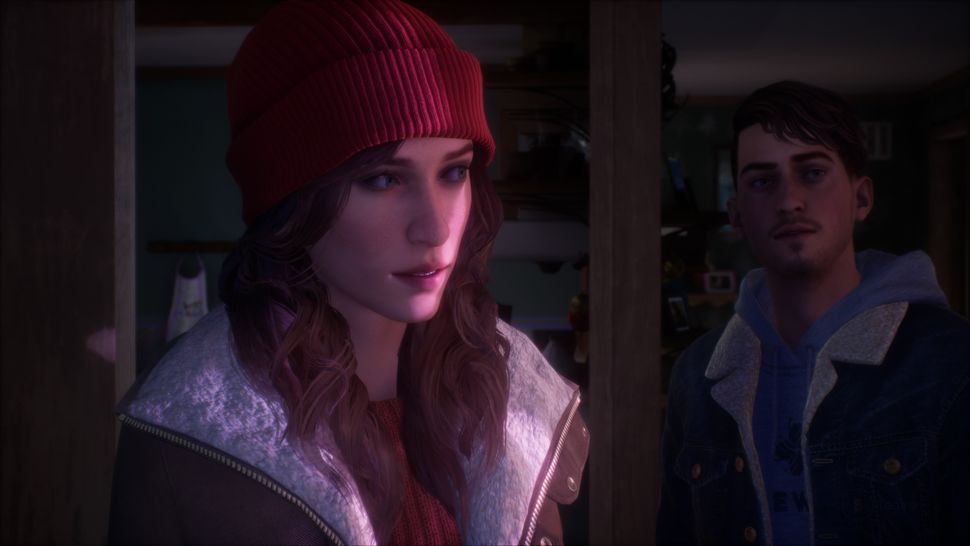
Chapter Three specifically belongs to Alyson, just as Chapter One was Tyler’s and Chapter Two was for Delos Crossing. She’s definitely been the supporting star so far, but benefits here from being given room to breathe and really comes into her own. Speaking of room to breathe, Chapter Three only has one weakness: there’s an anxiety coping minigame on Alyson’s phone which I didn’t understand, and instead of calming me down it made me want to throw her phone into the sea.
Every conversation Alyson has is deeply affecting, and the twins’ voice and memory vision, until this point just an intriguing mechanic, becomes both narratively and thematically interesting through her eyes. Tyler only really gets one scene, a lake fishing scene with Michael, but Tyler being Tyler, it steals the show.
You get a much gentler role in shaping Tyler’s sexuality and romantic interests than you typically do in other choice-based games, and that’s shown most effectively here. I could spend the whole review and then some talking about this scene; it’s relentlessly queer, unashamedly masculine, and both artistic and awkward all at once. It takes the same big steps Brokeback Mountain did, throws in the complexity of life as a trans man, and presents it to us with a glorious sunset. I get that other people may not love this game like I do. There’s no jaw-dropping, outrageously fun parts to Tell Me Why. But I know I’ll always be able to point to that scene and say “That. That’s why I love this game.”
Not everyone will get it. And that’s okay.
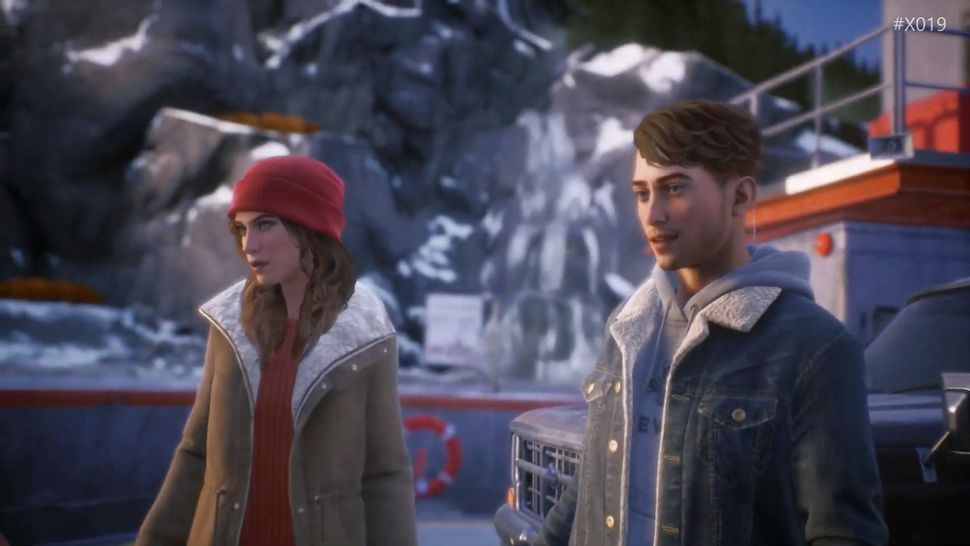
The game’s two final big reveals are both perfect, and focus less on trying to shock players than they do capturing the moment for Tyler and Alyson. Games like this often have puzzles or riddles thrown in there to make them feel more like a game; with the fuse box in Chapter Two, Tell Me Why falls victim to this itself. But the final set of puzzles, all folding into each other, are genius. From a basic point and click perspective, they’re colourful, fun, and inventive, but I guess they’re nothing too special. But it’s the way they fold into each other, revealing more about the game’s central mystery not just through the truths they uncover or the connections they make, but in the very way they are presented, which makes them magical.
I will be talking about Tell Me Why for a long time, although I’m not sure the world will. I don’t know if it will reach inside everyone’s ribcage and grip them by the heart the way it did me, or whether it will mostly be enjoyed as a pretty good game with a pretty good story. But I know for sure we’ll be talking about Tyler Ronan for a very long time. He’s deeply compelling, surprisingly complex, and he’s the first truly well written trans character in gaming who doesn’t need to have caveats attached.
Tell Me Why is best considered a miniseries, which is why, despite the reviews for Chapters One and Two being strictly about those chapters, this one takes a look at the game as a whole. I said in my first review it was the first game to understand the potential of Game Pass, and if these are the types of moving, more subtle stories we have to look forward to on the platform, I’d say that contrary to popular opinion, the future for Xbox looks very bright indeed.
Tell Me Why - Episode 2 review: "A story told with heart and soul" Score: 4/5
Tell Me Why’s first Chapter had a captivating atmosphere, but it had two major weaknesses; it lacked depth, and it lacked significant choices. The former is no longer an issue, and while the latter still remains, it feels a lot more like the game is playing to its strengths this time around.
As with last time, I write this review having finished Chapter Two but without beginning Chapter Three, so as to offer my thoughts on the game having experienced it the way it was intended. In my Chapter One review, I felt it was too concerned with setting the scene than telling its own story, something I hoped would pay off in Chapter Two; let me tell you, it does in spades. If the drawbacks Tell Me Why’s serial release style can be seen in Chapter One, their strengths can be found in Chapter Two.
The first entry felt like it was Tyler’s story, detailing his return, the man he has grown into. This time, things feel more evenly shared between the Ronan twins, with Chapter Two the story of Delos Crossing itself. Already conversations with Michael feel like talking to an old friend, even though we saw him for all of ten minutes in Chapter One. His conversation with Tyler in the storage room touches on queerness, togetherness, loneliness, and the value of confronting your trauma, managing to be moving, subtle, and powerful in the space of a few lines.
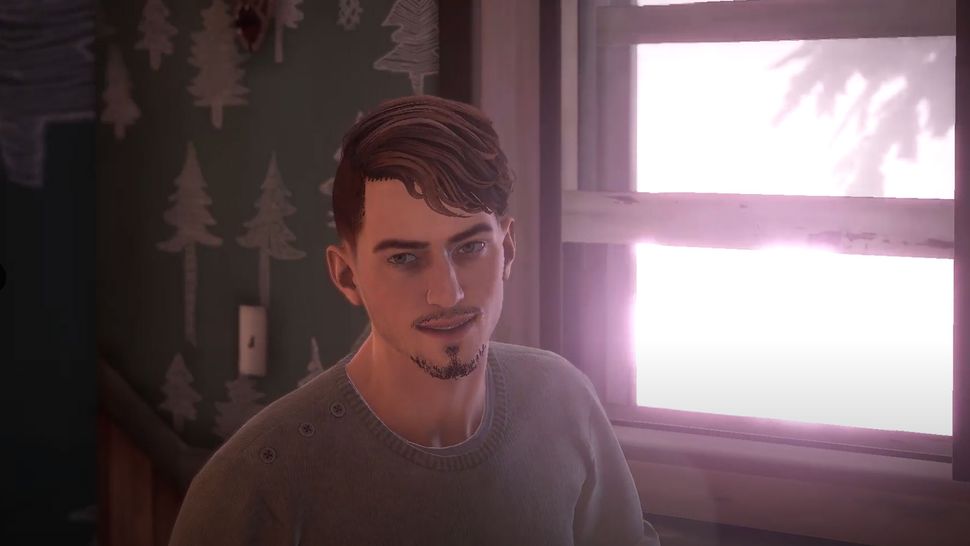
I could move to the other scenes with similar depth of character, which also explore complex themes rooted inside real conversations, but I don’t think there’s too much value in just dancing around the scenes and saying similar things. Michael’s was the one which ‘got’ me, but I can see others having a similar reaction to a different one. The main takeaway is, Chapter Two is a story told with heart and soul.
In every scene, our protagonists feel like a real part of the town, folded into a story bigger than their own. Tyler and Alyson are the main characters because we play as them and it’s their story, but there’s another version of Tell Me Why where they’re bit part players in a game all about Eddy’s time on the force, Michael preparing to move away, or Tessa and her small town faith. It’s a real and underappreciated skill in narrative writing to make your protagonists the clear central characters while providing just as much depth to the supporting cast.
The scene with Michael also gives you some level of choice over Tyler’s sexuality, in a more measured version of Life Is Strange’s ‘Kiss Chloe’ scene. For what it’s worth, I love the boldness of Max’s choice with Chloe in Life Is Strange, but I appreciate Tell Me Why tackling the issue in a more human, less binary way.
That brings us nicely to the choice system in Tell Me Why. The first Life Is Strange game remains the pinnacle of this genre for me, offering big, brash choices at every turn. Kiss Chloe or don’t. Go to the cops now or try to find proof. Steal the money or leave it in the drawer. Both options are clear, have definite consequences, and result in a big reaction. Tell Me Why’s are played more gently. There’s a moment where Tyler can either accept or reject the idea of getting closer to Chief Brown, but it’s not like the options are ‘give him a big hug’ vs ‘punch him in the face’.
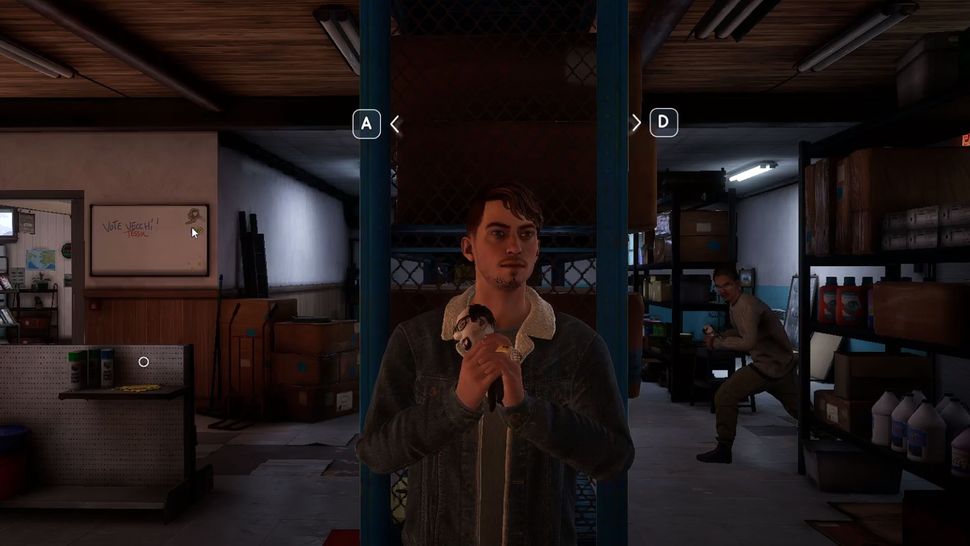
It’s more real, and I understand exactly why they’re doing it. Tell Me Why is one of the most subtle games I’ve ever played. But goddamn, I wanted to sock Chief Brown in the face. I wanted my characters to have a moment… and they don’t. Or rather, when they do, they have them independent of me and my choices.
It’s especially a shame because Chapter Two has so much more gameplay than Chapter One. You get a snowball fight (with cuddly toys) against Michael which includes real aim and trigger functions, there’s a complex mystery to unravel through game mechanics, the other puzzles go up a step, and the collectibles are far more hidden this time around. Chapter One leans heavily towards being a visual novel with gameplay features, but Chapter Two is much more of an adventure game with dialogue options.
The scene at the station is particularly meaty, and I think the game strikes a great balance between letting you play, driving the game through conversations, and providing you with puzzles. Occasionally the puzzles can just feel like they’ve been put there to give you something to do, but the ones that lace in the Book of Goblins really pull you into the game’s world and Alaskan inspired artstyle.
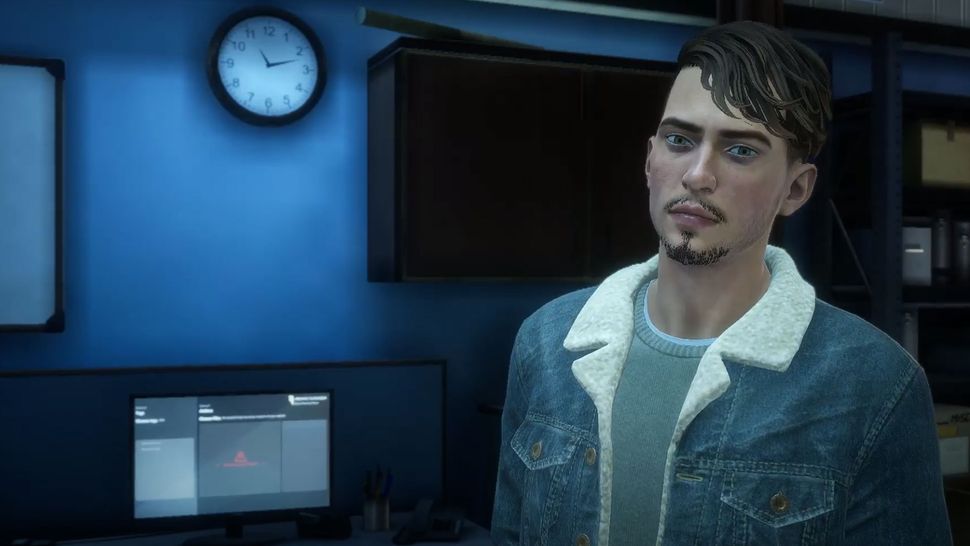
On balance, even though you can make some significant choices on a character level, I would like to have had some more measurable ‘A or B’ moments. Perhaps these smaller choices will all tie together in Chapter Three, but I’m not hopeful. Then again, I don’t think it would bother me if they don’t; the choices don’t feel like they’re the point here, which is honestly a welcome departure from the forced options in some other games in this genre.
Going into Chapter Three, I’d rather have even more depth, mixed in with some resolutions, and perhaps a bit more spotlight for Alyson than I would have the game desperately try to combine every choice I made. Chapter Two definitely reaps what Chapter One has sowed, and leaves room for Chapter Three to climb even higher. I’ll admit my initial fascination with the game was all about Tyler, but now everyone in Delos Crossing has a place in my heart.
Turn to page two for our Tell Me Why Chapter 1 review
The Verdict
5
5 out of 5
Tell Me Why
Tell Me Why has reinvented the choice based adventure game as something more subtle and character driven, and leads the way as Xbox moves from big exclusives to a steady stream of GamePass gems. In Tyler Ronan, they’ve given us a character for the ages.
More info
| Available platforms | Xbox One, PC |
Less
Tell Me Why - Episode 1 review: "Inspired by things inspired by Twin Peaks" Score: 4/5
Tell Me Why feels like the first game that actually understands Xbox Game Pass. For most games, it’s simply a method of delivery; a Netflix for games that can bring smaller games to a wider audience and guarantee a steady market for the bigger ones without needing to worry too much about price tags, release windows, or other issues which can derail games that might otherwise have been a success. Tell Me Why, however, understands it not just as a platform, but as a new storytelling tool.
This review tackles Chapter One in isolation; I’ve been provided with all three Chapters by Microsoft, but have deliberately not started Chapter Two until completing this review. That’s the way everyone else will play the game, and I think it’s fair that my review should have the same context. However, unlike other episodic games such as Telltale’s The Walking Dead or DontNod’s own Life Is Strange, Tell Me Why’s individual chapters are not supposed to be standalone experiences that fold into a singular story, nor are they to be separated by months. If we compare GamePass to TV streaming, Tell Me Why’s model is The Mandalorian. The three chapters have been produced together, and will release weekly, sliced up in order to better allow for the intrigue to build and the plot turns to be digested.
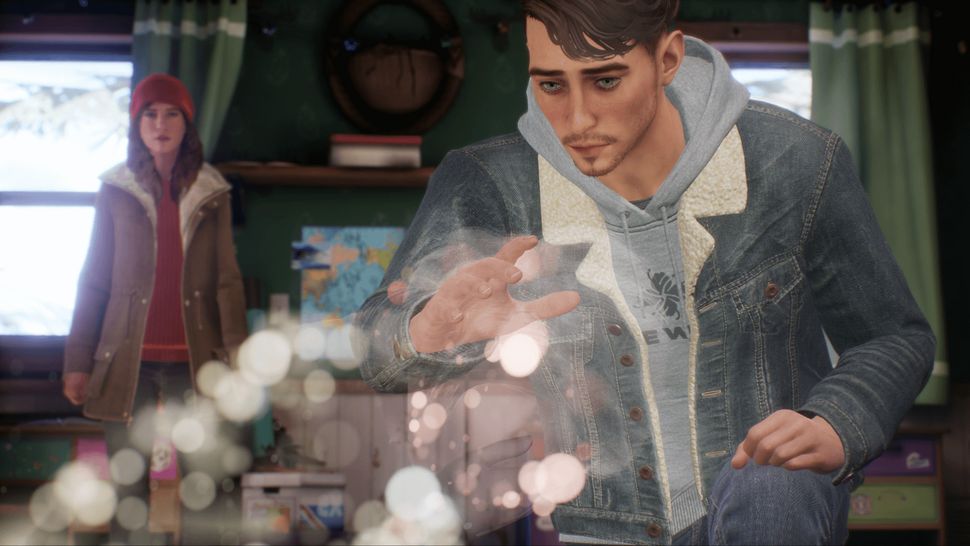
This structure explores the newfound freedom Game Pass offers to developers in a creative new way, and part of me fears my method of review is outdated. What I will say then is that as the opening chapter of a miniseries, Tell Me Why - Chapter One is stellar. It sets up the overarching mystery perfectly, captures the tones and atmospheres of the town, brings in some interesting characters, and quickly establishes who Tyler and Alyson are. I was rooting for them from their first scene together. Examining it as a game in a vacuum? It rips characters away from you just as you’re getting to know them too often, and bounces around from introduction to introduction pretty much throughout. If the following chapters build on the groundwork laid here though, expect that star rating to rise.
In the game itself, the elephant in the room is that Tyler is trans, making this easily the biggest game to have a trans protagonist. He is, quite simply, the new gold standard for trans characters in video games. It’s not just that he exists as a trans man leading a major video game, but the confidence with which he is portrayed. The game doesn’t shy away from the word “transgender”, nor does it use it melodramatically. Tyler makes references to being on testosterone, and while everyone reacts differently to seeing Tyler for the first time, all seem realistic and none seem mean spirited or use transphobia to raise the stakes. DontNod Entertainment has provided a helpful FAQ section to help you avoid any triggering moments here. The biggie: his deadname is never used.

I’ll avoid saying much more on Tyler’s transness specifically to avoid story spoilers, but Tyler is much more than just a trans man, anyway. He’s a witty man, a driven man, an occasionally acerbic man. Alyson, his twin sister, is also playable, and she’s slightly warmer, more outgoing, but also perhaps more naive. Play switches between them throughout different scenes, and Chapter One does a great job of establishing their personalities, past, and problems, but it feels very much like Tyler’s game.
That’s to its credit though; the swaps between them happen naturally, rather than enforcing a strict 50/50 split. Tyler, like us as players, is new in town too, so the tilting towards his perspective feels like a very smart choice.
The twins have the power to communicate telepathically, and can also revisit and rewatch each other's memories if they both focus on a certain point, something the game uses well as both a storytelling device and as an actual mechanic for gameplay, particularly choice based play. It’s laced into the story well and peppered around at a rate which would be ideal, were it not for the fact Chapter One feels like it lacks a real blockbuster choice. Obviously some decisions here will have ramifications, but the biggest twists are shown to you, rather than giving you any agency in the decisions; a substantial disappointment in a choice-based game.
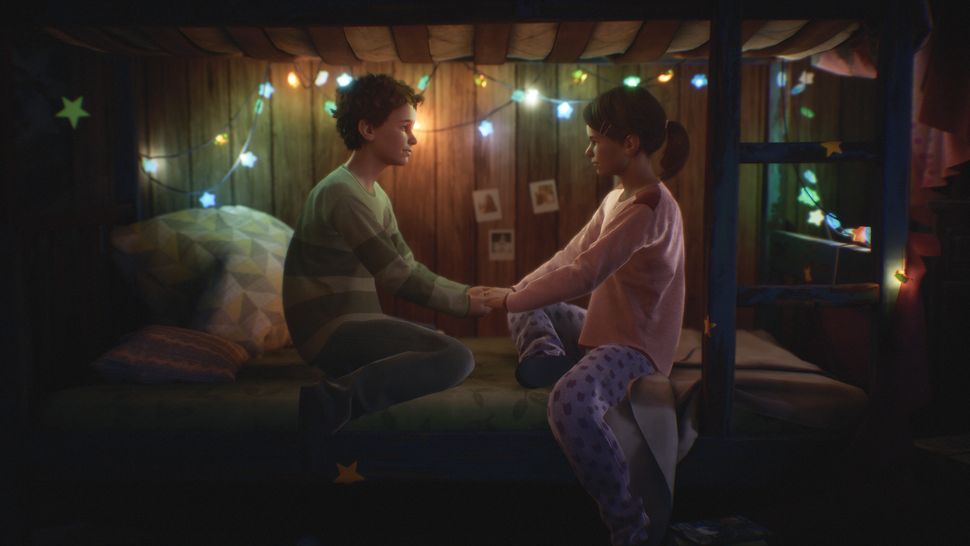
That aside, this magical element adds a touch of sparkle to the game, which by its nature as a crime mystery gets a little dour. Tell Me Why feels like it was inspired by things inspired by Twin Peaks, far enough away to not feel like it’s derivative but close enough that the fingertips of David Lynch’s series’ ghost can be felt around the edges. Think a less violent Tin Star and you’re along the right lines.
The game’s setting, Delos Crossing, Alaska, is particularly in need of the distinction between reviewing this as a single game, and thinking of it as a table setter for something greater. The world flows together with brilliant cohesion, building a place as cold and brooding as it is colourful and welcoming. I’ve never been to Alaska, and yet I felt as nostalgic as Tyler was upon his return. The old house feels especially bursting with flavour, scattered with creative artwork, colours, and a firm identity.
The game strikes a good balance between linear storytelling and letting you wander and soak up the lore, but you visit a few too many places and meet a few too many people for the Chapter’s run time. Because of this, while you uncover some interesting twists to the game’s central mystery, I didn’t feel like we were given enough breadcrumbs to figure any gaps out for ourselves.
I’m eager to rejoin Tyler and Alyson again - as well as hopefully get more information from the blink and you’ll miss ‘em side characters like Michael - because the people make this game what it is. I’d like to start figuring out the story, but I’m mainly in it for the characters right now.
Chapter 1 verdict:
Tell Me Why - Chapter One is brilliant if you think of it as the opening entry of a mini series, but only pretty good as a game. This is very much an exercise in sowing, but hopefully Chapters Two and Three can be more about reaping.
The Verdict
5
5 out of 5
Tell Me Why
Tell Me Why has reinvented the choice based adventure game as something more subtle and character driven, and leads the way as Xbox moves from big exclusives to a steady stream of GamePass gems. In Tyler Ronan, they’ve given us a character for the ages.
More info
| Available platforms | Xbox One, PC |
Less